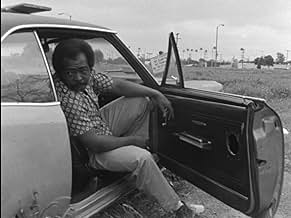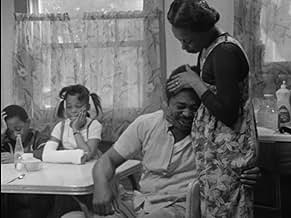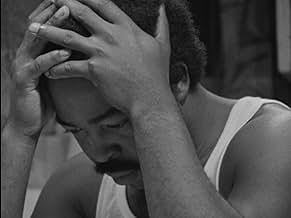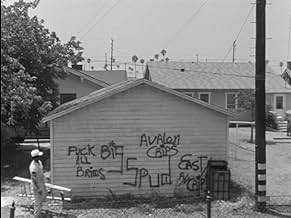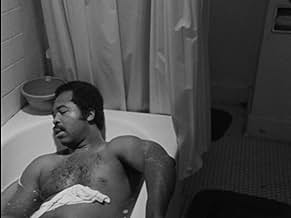A dramatic look into the life of a family in Watts.A dramatic look into the life of a family in Watts.A dramatic look into the life of a family in Watts.
- Awards
- 4 wins total
- Director
- Writer
- All cast & crew
- Production, box office & more at IMDbPro
Featured reviews
This movie ends up being less than the sum of its parts - which shouldn't keep you from watching it.
Let's start with the good - indeed, great - parts. Charles Burnett's cinematography is often downright spectacular. The opening sequence, with Charlie looking for a job at the employment office and then, after he doesn't find one, walking slowly back home through the train yard, finally sitting in despair on the tracks, is rivetingly beautiful. Not a word is spoken. But every angle, every shot adds to the mood. It is just masterful. As, subsequently, is the scene of Charlie shaving, and ..., and ..., and ... In all these scenes there is no dialogue. But the black and white images, often accompanied by jazz, are remarkable, and certainly make this movie worth watching.
But then come the negatives.
First, a long sequence of slow scenes like that with no contrasting faster-paced ones eventually hangs heavy on the viewer, or at least this viewer. After the opening scene, we never really see Charlie hunting for a job again. That is unfortunate, because we come to see him as lazy/shiftless after a while. The end of the last scene really emphasizes that. A few more job hunting scenes, done with different pacing, could have given the film more variety as well as reminded us that Charles is, indeed, trying to find work to support his family. (Yes, I know, he is depressed, and that is a real issue and a debilitating one. But so is his wife, and she manages to keep on going.)
Second, the dialogue, also by Charles Burnett, often falls flat. (You can't be first-rate at everything, and Burnett is clearly a first-rate cinematographer.) Perhaps it should have been turned over to someone else. Sometimes I found it stilted and unnatural, sometimes I found it preachy. (The scene in the barber shop is a good example, as is the scene early on with the men sitting around another table talking about ways to make some money.) Sometimes I just wished Charlie (the male lead) had been more honest with his wife. The long scene in the kitchen where he refuses to admit his infidelity to his wife is full of clichés and really leaves him looking like a scumbag. I doubt that was the intention of those making the film.
The acting here is fine to very fine. Nate Hardman expresses so many emotions with just a few glances and gestures, as when he looks at his kids in the kitchen after he gets home from a failed attempt at job hunting and so clearly feels like a failure to them, so clearly is ashamed.
Billy Woodberry's direction is masterful in the wordless slow scenes. He knows just what to show, and how long to show it. If he was telling his actors where to go and how to position themselves, he did a great job. It's very definitely a shame that he did not get to hone his very considerable skills through a string of subsequent films, and so learn to introduce a little variety.
Let's start with the good - indeed, great - parts. Charles Burnett's cinematography is often downright spectacular. The opening sequence, with Charlie looking for a job at the employment office and then, after he doesn't find one, walking slowly back home through the train yard, finally sitting in despair on the tracks, is rivetingly beautiful. Not a word is spoken. But every angle, every shot adds to the mood. It is just masterful. As, subsequently, is the scene of Charlie shaving, and ..., and ..., and ... In all these scenes there is no dialogue. But the black and white images, often accompanied by jazz, are remarkable, and certainly make this movie worth watching.
But then come the negatives.
First, a long sequence of slow scenes like that with no contrasting faster-paced ones eventually hangs heavy on the viewer, or at least this viewer. After the opening scene, we never really see Charlie hunting for a job again. That is unfortunate, because we come to see him as lazy/shiftless after a while. The end of the last scene really emphasizes that. A few more job hunting scenes, done with different pacing, could have given the film more variety as well as reminded us that Charles is, indeed, trying to find work to support his family. (Yes, I know, he is depressed, and that is a real issue and a debilitating one. But so is his wife, and she manages to keep on going.)
Second, the dialogue, also by Charles Burnett, often falls flat. (You can't be first-rate at everything, and Burnett is clearly a first-rate cinematographer.) Perhaps it should have been turned over to someone else. Sometimes I found it stilted and unnatural, sometimes I found it preachy. (The scene in the barber shop is a good example, as is the scene early on with the men sitting around another table talking about ways to make some money.) Sometimes I just wished Charlie (the male lead) had been more honest with his wife. The long scene in the kitchen where he refuses to admit his infidelity to his wife is full of clichés and really leaves him looking like a scumbag. I doubt that was the intention of those making the film.
The acting here is fine to very fine. Nate Hardman expresses so many emotions with just a few glances and gestures, as when he looks at his kids in the kitchen after he gets home from a failed attempt at job hunting and so clearly feels like a failure to them, so clearly is ashamed.
Billy Woodberry's direction is masterful in the wordless slow scenes. He knows just what to show, and how long to show it. If he was telling his actors where to go and how to position themselves, he did a great job. It's very definitely a shame that he did not get to hone his very considerable skills through a string of subsequent films, and so learn to introduce a little variety.
I join with my three IMDB colleagues (there should be more!) in lauding this 80s LA kitchen sink drama about the corrosive effects of joblessness and poverty on a black family and marriage. Most of the things I like about this gritty, grainy work are covered by the previous reviewers, especially the always cogent gbill-74877. I would add that I admire the choice that director Billy Woodberry and writer/cinematographer Charles Burnett make to depict fecklessness from within rather than racism from without to be the main adversary this embattled family faces. And I would note that Woodberry at thirty four and in his first film shows a compassion toward his characters that many more experienced and older directors should envy.
Is there a flaw? Unfortunately, yes, and in my opinion it lies within Burnett's screenplay. It is not that the story is too "thin". There is nothing wrong with soft peddling plot to emphasize character, especially when the characters are played by such compelling actors as Kaycee Moore and Nate Hardman (especially the former). However, there is simply too much padding and filler in this film, too many scenes where not much is going on, like Hardman's character shaving and repairing his fishing line, that serve to bring the pace and flow to a thudding halt and that is never, in my view, a good thing.
Bottom line: Agree with gbill that it's a tragedy equal to the one portrayed in this film that Woodberry did not get to make more movies. Give this one a B plus.
Is there a flaw? Unfortunately, yes, and in my opinion it lies within Burnett's screenplay. It is not that the story is too "thin". There is nothing wrong with soft peddling plot to emphasize character, especially when the characters are played by such compelling actors as Kaycee Moore and Nate Hardman (especially the former). However, there is simply too much padding and filler in this film, too many scenes where not much is going on, like Hardman's character shaving and repairing his fishing line, that serve to bring the pace and flow to a thudding halt and that is never, in my view, a good thing.
Bottom line: Agree with gbill that it's a tragedy equal to the one portrayed in this film that Woodberry did not get to make more movies. Give this one a B plus.
This film brings back so many memories of my childhood...it is for me, poignant, as I remember how we struggled growing up in Compton-the poverty, the infidelity, the arguments...all were a part of everyday life for us.
I love that it's filmed in black and white. The way the mother fusses and the children, the infrequent shows of affection are powerful...the father's tendency to want to escape while the mother stays focused (even as the friend encourages her to cheat)-all so excellently portrayed by the actors.
I was curious as to what happened to the actors. I couldn't find anything on Nate Hardman but I did learn that Kaycee Moore passed away in 2021.
I love that it's filmed in black and white. The way the mother fusses and the children, the infrequent shows of affection are powerful...the father's tendency to want to escape while the mother stays focused (even as the friend encourages her to cheat)-all so excellently portrayed by the actors.
I was curious as to what happened to the actors. I couldn't find anything on Nate Hardman but I did learn that Kaycee Moore passed away in 2021.
There's an almost documentary feel to this short drama that follows the "Banks" family who are struggling to make ends meet. That's basically because husband/father "Charlie" (Nate Hardman) is habitually unemployed. This puts the strains on his wife "Andais" (Kaycee Moore) and their relationship whilst he imposes a very strict, masculine, discipline on their three children. There is a real paucity of dialogue in this as the intimately photographed imagery is left to show us the relentless mundanity of their lives. "Charlie" is not a nasty or violent man, but he is set in his ways and has no intention of straying from his own path - however inconsistent that may be with would be employers or his children who are, slowly but surely, beginning to show traits of adulthood and choice that he doesn't especially like. He is also not averse to playing on the other side of the blanket. There's a complex relationship going on here between the couple and Moore plays her part strongly. "Andais" is frustrated and disappointed with their lot in life, but is stoic enough to lose her temper but occasionally with a "Charlie" that she clearly loves, but finds exasperating at times. It's an observation of a snippet from their timeline. We join mid-flow and we leave in a similarly inconclusive fashion which, again, adds some realism to this depiction of life for an African American man whose predicaments and options are exclusively made on what he sees are his own terms.
10tRiVi8L
Woodberry, part of the (UCLA) Film Rebellion movement along with other colleagues such as Julie Dash, constructed this documentary-like saga of life in South Central, L.A. during the early `80s. Showing an uncommon (especially at the time) subject through an avant-garde/foreign (brazilian and cuban) style comes off grandly as part of the Rebellion movement .... showing all of us that mainstream cinema doesn't (and cannot) handle every aspect of film. An extremely different, unsentimental, and pleasant experience.
Did you know
- TriviaIn 2013, this film was selected by the Library of Congress for preservation in the United States National Film Registry for being "culturally, historically, or aesthetically significant".
- ConnectionsFeatured in Los Angeles Plays Itself (2003)
Details
- Release date
- Country of origin
- Language
- Also known as
- ευλογημένες καρδιές
- Filming locations
- See more company credits at IMDbPro
- Runtime
- 1h 20m(80 min)
- Color
- Sound mix
Contribute to this page
Suggest an edit or add missing content


